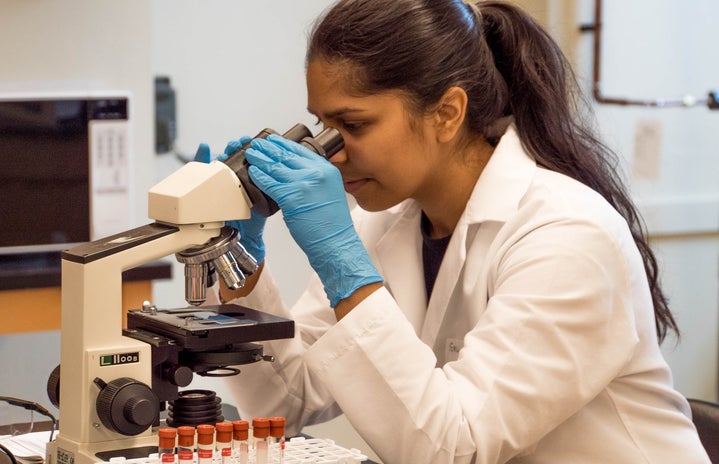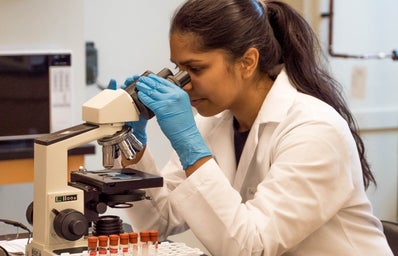We seek control in a system that is out of control.
I’ll be the first to admit that my favorite subject in school isn’t science. Yes, I want to go to medical school and eventually become a doctor. But the classes that interest me the most have nothing to do with learning about the biology of plants or the endless reactions of different organic molecules that frankly, I know nothing about.
I’m fascinated by the humanities that go into medicine. I gravitate towards classes where I learn about health disparities and systems that put different populations into vulnerable health situations. I excel in these courses and my grades – and GPA – reflect that. I’m a public health major and while I do understand that if I want to be a doctor, I have to know the sciences, I’m at a point in my education where I have the space and privilege to explore these different interests. Interests that will honestly make me a more well-rounded physician in the end. Unfortunately, the American pre-med system doesn’t take these interests into account.
The American pre-med system is deeply centered on academic success. A high – nearly perfect – GPA and MCAT score accompanied by good grades in biology, chemistry, and endless pre-med requirements are things we all aim for. Now pile on extracurriculars, leadership positions, research, volunteering, clinical jobs, and maybe a hobby so you don’t seem too robotic to medical school admissions groups. The outcome? Tunnel vision that may get you into medical school at the cost of already being burnt out.
There are so many things that make an individual a good candidate for medical school. I fully believe that anyone can be a doctor if they want it badly enough. But the American pre-med system has created a culture of competition that relies heavily on students pouring out everything they have to build impressive resumes that support their “why medicine.”
I am not the perfect student. My transcript is a mix of letters, pluses, and minuses – and until very recently, I believed that withdrawing from a course for whatever reason meant that I had failed and ruined any changes I had at achieving my future goals. But that is far from the truth.
Endless science courses that are designed to “weed out” students have made individuals question their “why medicine”, their worth, and their place at a top public university. Students sit through STEM courses they often are not that interested in because they are part of the pre-med requirements, their majors, or even because they “look good” to admissions teams. We place so much significance on the value these courses hold on our futures that we feel like we no longer have control on what we want to learn about because the system has made it out to look like we have to follow a specific timeline – and when we don’t, we are labeled as “non-traditional pre-med students.”
But why is there a “traditional pre-med student” in the first place? Why do we feel the need to follow a timeline that has been created by generations of pre-meds to be successful?
The competitive nature of the American pre-med system has led so many of us to believe that any deviation from a “normal” timeline and any unchecked boxes from the list of achievements we need to check in the four years of our undergraduate careers makes us “unfit” to be physicians. These timelines and checklists are there for us to feel a sense of control when we have the same goal as thousands of our peers who want to attend the same medical school and have the same career.
We constantly hear “you have time”, “a bad grade does not define you”, and everything in between – most of us brush off these comments without a second thought. But this semester has taught me so much. We are so young, and we have so much time to figure it all out. These years are the years where we should take advantage of trying – and failing – at new things and diving into new interests. Despite what has been engraved into our heads very early on, your GPA, MCAT score, and extensive resume are not the things that make you the ideal or most competitive pre-med student. Instead, the reason why you are doing this all in the first place is what makes you a good pre-med student and what will make you a good physician in the end.
The American pre-med system is outdated, dehumanizing, and broken. Pre-requisite science classes have been the same since the 1900s and the MCAT has been around for nearly 100 years as well. This system was designed around understanding and applying basic sciences. The problem with this system? Much of modern medicine isn’t focused on these basic sciences.
Medical training is centered around patient care understanding the human body – how to care for it —rather than organic chemistry reactions and physics equations. Instead of preparing us for our future medical careers, the American pre-med system creates cutthroat competition between students and tests who can get the furthest ahead – and who doesn’t burnout in the process. The concern with this is that students who come from privileged backgrounds are the ones that can pay for tutoring services, have greater connections to doctors to shadow and labs to work at, and can easily access medical school prep services that others who don’t come from the same privileged backgrounds can’t.
The American pre-med system lets students who come from underprivileged backgrounds fall behind.
The American pre-med system lets students who suffer with mental health concerns fall behind.
The American pre-med system lets students who have disabilities fall behind.
The American pre-med system lets students who may follow an “untraditional path” fall behind.
The American pre-med system lets students who may excel in class but don’t test well fall behind.
We so strongly want to be in control in a system that is so out of control. Your desire to be a doctor and achieve a goal should not be diminished or altered because of a system that so strongly wants you to fail and needs change. Your “why medicine” is your biggest asset, hold on to it.


